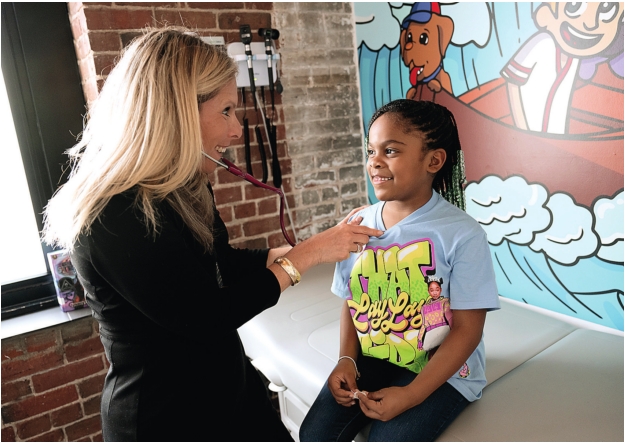
A South End pediatrician and community healthcare leader was named a 2025 Commonwealth Heroine last month, an award that recognizes extraordinary acts of service by women in Massachusetts.
Dr. Robyn Riseberg, the founder of non-profit health clinic Boston Community Pediatrics (BCP) on Albany Street, was nominated for the award for her work of bringing equity to pediatric healthcare in the city.
Riseberg has spent her entire medical career in community health, working with clinics like the South End Community Health Center.
She
started (BCP) in 2020 as the first non-profit private practice in the
state, after she became frustrated with the bureaucracy of medicine
slowing down how patients can access care.
“After
listening to families for 15 years and understanding what their
frustrations were in terms of accessing healthcare and getting through
to a live person on the phone when they needed help, I thought, ‘There
has to be a better way to do this,’” Riseberg said.
BCP has only grown in its first five years.
When
it opened, it had 12 staff members. It now has 23, including five
pediatricians, one pediatric nurse practitioner, and two full-time
mental health clinicians. Riseberg said she’s especially proud that
nobody from the medical team has left. BCP was also named one of the
best places to work in the city by the Boston Business Journal this year.
“It’s
really been transformative to be able to create my utopia of
healthcare, and not just mine, but what the patients want and need,”
Riseberg said. “Normally, healthcare models start at the top and trickle
down, and at the bottom is the patient. Here, we start with the patient
and everything that we do goes out from there. An example is most
healthcare providers have 15-minute or 20-minute visits for patients.
Our visits are 30 to 60 minutes long, because we know that patients need
more time with their providers.”
The
clinic is located at 527 Albany Street, just down the road from the
Boston University medical campus. The South End has been designated by
the federal Health Resources and Services Administration as a medically
underserved area and has one of the highest percentages of affordable
housing in the city.
In
2024, the clinic treated approximately 1,600 patients. The majority of
those patients are people of color and come from low-income families.
“In approximately 50 percent of Latinx families served, parents speak
limited English,” the clinic wrote in a statement. “Nearly half of
patients belong to single-parent households, over 40 percent are food
insecure, and many live below the Federal Poverty Level. Over 80 percent
of BCP's patients have Medicaid as their primary or secondary
insurance.”
Because of
this, Riseberg said, the clinic both partners with external community
services in the city and offers help with housing and food insecurity
in-house.
“We don’t
just give them a piece of paper, we actually help them fill out housing
applications,” Riseberg said. “We help them renew applications. We help
them get into emergency shelter. With partnerships, at every visit, we
provide food and hygiene products and underwear and clothing, to best
support families so that they don’t have to go to multiple places to get
everything they need. That’s just a part of the care that we provide.”